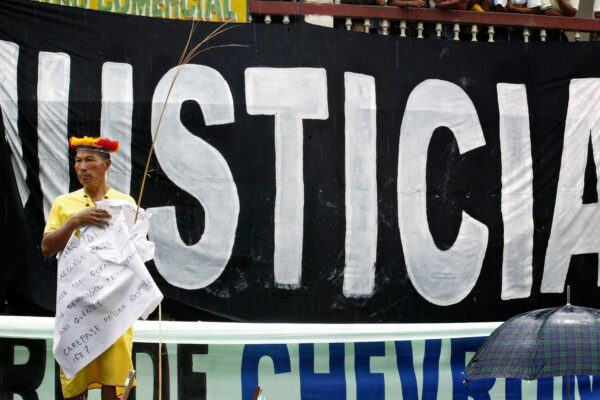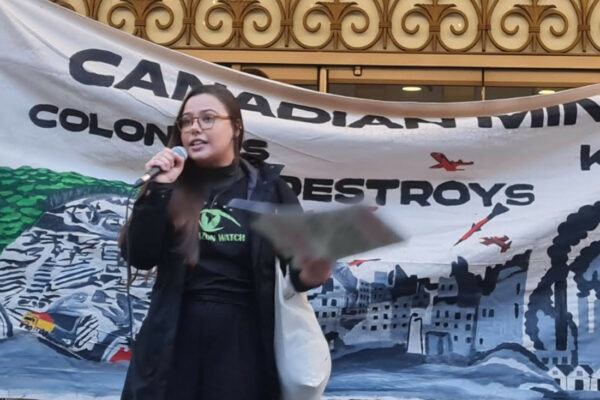Washington – It was part of Vice President Gore’s plan to streamline and “reinvent” government: Sell off a 47,000-acre oil field in Southern California. The taxpayers would benefit.
But so did one company: Occidental Petroleum, which eventually bought the land through competitive bidding in 1997. The company had decades-long ties to Gore’s family. Its founder flew Gore to Europe in a private jet, and put his father on the payroll after he left the U.S. Senate in 1971.
In a 370-page report issued yesterday, a Washington nonprofit group raised questions about Gore’s role in the land sale, which he has defended. The report asserted that it was one of many instances in which the current crop of presidential contenders did things that wound up benefiting their “career patrons.”
“Each of the leading presidential candidates for the 2000 election has done public-policy favors for his campaign contributors,” said Charles Lewis, the former 60 Minutes producer who heads the Center for Public Integrity and who was the main author of its report. “Every major White House contender who has held past elective office has ‘career patrons,’ or longtime financial sponsors, who have underwritten his political career. And every major aspirant has used his government position to help his patrons.”
The report, titled “The Buying of the President 2000” and made public yesterday at a Washington news conference, criticized Democrats and Republicans alike, and offered detailed lists of both parties’ top donors and their interests.
For example: Texas Gov. George W. Bush, the Republican front-runner, has been friendly to the oil industry, allowing such major corporations as Exxon and Marathon Oil to craft their own emissions regulations, the center contended, echoing a criticism made by environmentalists.
Bush spokesman Scott McClellen responded yesterday: “Gov. Bush makes his decisions based on what is right for Texas, and as president he will make his decisions based on what is right for America. . . . Americans can certainly look for themselves at our donor list posted daily on our Web site to see the broad base of support he has all across America.”
Bill Bradley, the former New Jersey senator who is challenging Gore for the Democratic nomination, drew hefty campaign contributions from the chemical industry. The study asserted that Bradley has proven to be a friend of the industry, introducing numerous bills that eliminate tariffs on certain highly toxic pesticides.
And despite his image as a blunt reformer intent on cleaning up campaign finance, Arizona Sen. John McCain “rarely breaks ranks with the special interests who finance his campaigns” – the telecommunications industry, railroads, real estate developers and mining companies, the study said.
Lewis said his team of 24 editors, writers and researchers got no cooperation from any of the presidential candidates. His researchers were put off with year-long claims that the candidates had no time for an interview, he said.
Lewis said that when the center asked the Gore campaign for an interview, a written reply came from a campaign lawyer – who questioned whether it would be legal for a tax-exempt group such as the center to hold such an interview.
The Gore campaign yesterday defended the vice president’s conduct in the Clinton administration’s 1995 recommendation to sell the oil field. And Lewis conceded that he hasn’t answered every question about Gore’s role in the decision. “It’s very difficult for me to tell you precisely what Al Gore did on this thing,” he said.
The study said that the oil field known as Elk Hills, near Bakersfield, Calif., had long been coveted by the oil industry. The Navy had held it since 1912 as an emergency oil reserve.
When Occidental bought it from the government, it was the largest privatization of federal property in history and it tripled Occidental’s U.S. oil reserves.
After the government decided to sell the land, various companies bid on Elk Hills, and the U.S. Department of Energy awarded it to Occidental in 1997.
The study painted Gore as something of a hypocrite, giving a speech about global warming and the dangers of fossil fuels within hours of the announcement of the government’s sale of Elk Hills.
Ties run deep between Occidental’s founder, the late Armand Hammer, and the Gore family, the study said.
Hammer would boast that he had the late Sen. Albert Gore Sr. “in my back pocket,” the researchers wrote, quoting words that had previously appeared in writings about Hammer. After the elder Gore retired from the Senate in 1971, Hammer made him chairman of an Occidental subsidiary – at a salary of $500,000 a year – and put him on Occidental’s board of directors.
In the 1960s, the study said, Hammer bought zinc-rich land near the Gore farm in Tennessee. He then sold the land to the elder Gore. Occidental paid Gore Sr. $20,000 in annual royalties to mine the property. But after the first payment, the father sold the land to his son. The younger Gore then began receiving $20,000 checks each year for the mining – at first from Occidental, and years later from another zinc company to whom he leased the lot.
“In all, the Hammer-engineered sweetheart deal has put hundreds of thousands of dollars in profits in Gore’s pocket,” the study asserted.
A Gore campaign aide – who spoke on the condition of anonymity – noted yesterday that Occidental had purchased the oil field through an “open bid process” that received close congressional and media scrutiny. The company’s payment of nearly $3.7 billion was higher than Congressional Budget Office estimates of the property’s worth, the aide said.
“It was a very straightforward transaction, and as the center itself said today, they weren’t able to demonstrate any quid pro quo or make a connection. They’re making an insinuation where there’s really no evidence.”
Of the land transactions between Hammer and the Gore family, the aide added: “Decades ago the vice president’s father had a special relationship with Armand Hammer and then he left his son some land. But that’s the extent of it.”
The study said that Bradley, Gore’s Democratic challenger, had built relationships with political donors from Wall Street and from the pharmaceutical industry in his home state of New Jersey.
In a debate with Gore last night in New Hampshire, Bradley said of his actions on drug-industry tax breaks: “I never did anything that I didn’t think was in the interests of my constituents and this country.”
During his 18 years in the Senate, Bradley was known for expertise in arcane economic issues as a member of the powerful Senate Finance Committee. Bradley counts among his top achievements the Tax Reform Act of 1986, a measure that tried to close tax loopholes for the rich and corporations.
But that didn’t stop donors with interests in tax loopholes from supporting Bradley, the study found.
And when attempts were made to curb the multimillion-dollar tax deductions enjoyed by companies with huge debts arising from leveraged buyouts, Bradley opposed those curbs, the study said.
“He noted that those who sold companies to corporate raiders earned capital gains, which were subject to taxes,” the study said. “The bottom line, to Bradley at least, was this: ‘. . .It’s a wash to the federal government in terms of tax revenues.’ ”
The study contended it was not a “wash,” saying that in 1994 alone, corporations took a total of $611 billion in interest deductions, dwarfing the $173 billion in corporate income taxes paid that year.
Bradley’s presidential campaign yesterday dismissed the notion that campaign contributions influenced his positions.
“Sen. Bradley is somebody who leads from his beliefs . . . and I don’t think anybody can say he is someone who has ever been influenced by contributions in that way,” said Bradley spokesman Tony Wyche. He noted that on Tuesday, Bradley proposed to eliminate $124 billion in tax loopholes for businesses.
One expert said yesterday that it was wrong to assume big donors help candidates for one reason only.
“It is a reality that money comes from relatively few people,” said Thomas E. Mann, a senior fellow who studies campaign financing at the Brookings Institution. “That is the nature of the beast. Some are obviously trying to cozy up for legislative gains, some are trying to avoid having politicians mad at them, and others give because they have partisan interests.”
The group that prepared the report, the Center for Public Integrity, was founded in 1990. It has published 40 reports on topics ranging from the chemical industry to the August 1996 report “Fat Cat Hotel” that detailed President Clinton’s practice of rewarding top Democratic donors with overnight stays in the Lincoln bedroom.
The center’s annual budget of about $3 million comes from individual donations, proceeds from the sale of publications, and grants from the Florence & John Schumann Foundation, the Ford Foundation, the Pew Charitable Trusts and others.













